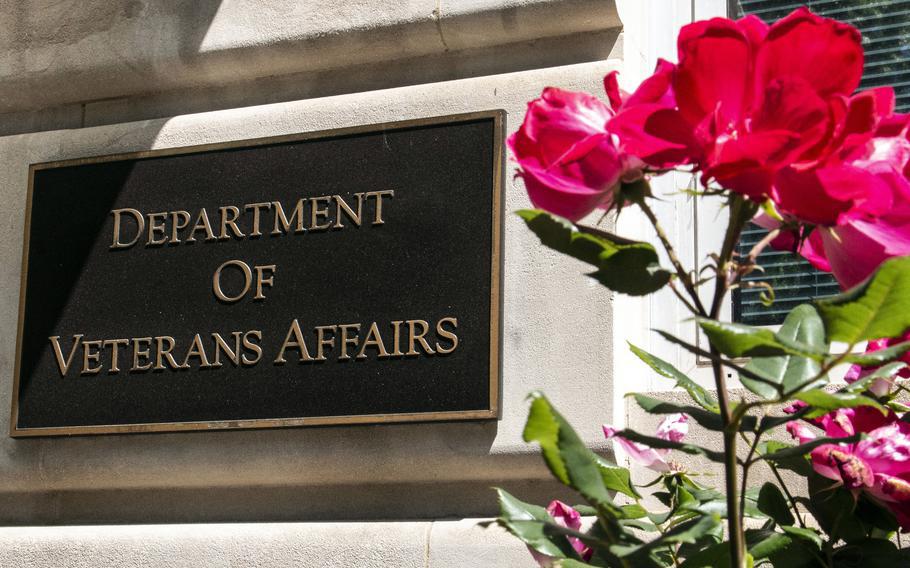
The VA headquarters in Washington, D.C., is shown in this undated photo. A Department of Veterans Affairs policy published Monday, March 4, 2024, in the Federal Register allows for abortion services to continue at VA health facilities, regardless of state laws that might prohibit such services. (Stars and Stripes)
The Department of Veterans Affairs on Monday made its abortion policy permanent, allowing the procedure at VA hospitals and clinics when the mother’s life is at risk or in cases of rape or incest.
The final rule, published Monday in the Federal Register, leaves an interim policy that has been in effect since September 2022 unchanged and provides for abortion counseling and services at VA facilities regardless of state restrictions, Terrence Hayes, the VA press secretary, said Monday.
The VA’s decision to allow certain abortion procedures overturned a 1999 exclusion to the VA health benefits package for veterans and other beneficiaries of CHAMPVA, which is the Civilian Health and Medical Program of the Department of Veterans Affairs.
CHAMPVA enrollees can include spouses and children of a veteran rated permanently disabled for a service-connected disability. The surviving spouse or child of a veteran who died from a VA-rated service-connected disability also can be a CHAMPVA enrollee.
“Specifically, VA will continue to provide access to abortion when the life or health of the pregnant veteran or CHAMPVA beneficiary would be endangered if the pregnancy were carried to term, or when the pregnancy is the result of rape or incest,” Hayes said.
VA employees, when acting within the scope of their federal employment, can provide abortion services regardless of state restrictions, according to the VA.
“Eligible veterans are able to access abortion services through VA, regardless of where they live,” Hayes said.
Leaving veterans without access to abortion services puts their health and lives at risk, he said.
The final rule codifies the Sept. 9, 2022, interim decision that enabled veterans and CHAMPVA beneficiaries to “access abortion counseling — and in certain cases — abortion,” Hayes said.
In addition, VA health facilities will continue providing a range of reproductive health services, including pregnancy care, fertility services and contraceptives, he said.
The number of female veterans using VA services has more than tripled since 2001, growing from 159,810 to more than 625,000, according to the VA. More than half are women of child-bearing age.
The VA on Monday declined to say how many abortions have been performed at its health facilities since the interim rule became effective in 2022.
“In order to maintain veteran-patient trust and protect veteran privacy, we do not publicly disclose data about the abortions we’ve provided,” Hayes said. “This care saves veterans’ lives, and there is nothing more important than that.”
Though the VA excluded abortion and abortion counseling from its medical benefits package in 1999, veterans still had access to abortions in their communities, according to the VA’s interim notice in the Federal Register.
But after the U.S. Supreme Court overturned Roe v. Wade on June 24, 2022, many states implemented abortion restrictions leaving veterans without access to services, according to the VA interim policy published in the Register on Sept. 9, 2022.
“It is thus essential for the lives and health of our veterans that abortions be made available if determined needed by a health care professional when the life or health of the pregnant woman would be endangered if the pregnancy were carried to term or the pregnancy is the result of rape or incest,” according to the Register notice published Monday.
The Justice Department will support and represent any VA health care providers who practice in states where abortions are prohibited, the White House stated when the initial rule change was made in 2022.
The VA said pregnancy and childbirth can cause serious physical harm or death to certain individuals diagnosed with life-threatening conditions that include preeclampsia, cancer and intrauterine infections.
The VA policy does not put time limits on when pregnancies can be terminated but leaves the decision up to the health provider to determine what is medically necessary and appropriate.
During a 30-day comment period on the interim policy that ended Oct. 11, 2022, more than 50,000 comments were received in support and opposition, according to the VA.
Many commenters also recommended changes to the interim policy, which were not adopted.
“As explained, the [policy] does not permit the provision and coverage of abortions in all circumstances,” the VA said.